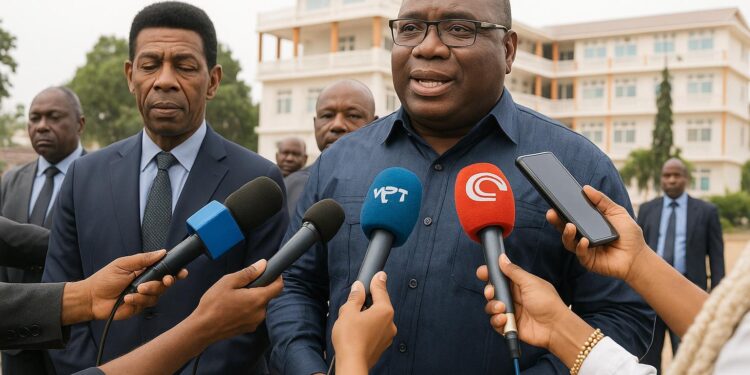Historic Milestone: 65 Years On
For the first time since 2018, the Atlantic hub of Pointe-Noire will host the principal civil parade marking Congo-Brazzaville’s 65th Independence Day, a decision confirmed by departmental prefect Pierre Cébert Ibocko-Onangha during a press encounter on 12 August.
His intervention aimed to quash rumours that logistical constraints would force cancellation, underscoring that workers were already erecting reviewing stands on the plaza beside the prefectoral hotel, and that the parade would begin promptly at nine o’clock on 15 August.
The prefect’s reassurance was subsequently relayed by national broadcaster Télé Congo and through a communiqué from the Ministry of Communication, adding institutional gravitas to the local announcement (Télé Congo, 12 Aug).
Beyond symbolism, the event offers Pointe-Noire a chance to showcase stability following two pandemic-disrupted years and to reaffirm its strategic role as the country’s economic engine and maritime gateway to Central Africa.
A Coastal City in the Spotlight
Pointe-Noire’s urban fabric differs markedly from the inland capital Brazzaville, blending oil-port infrastructure with cosmopolitan neighbourhoods that host a sizeable expatriate community and several diplomatic representations.
Officials expect roughly 15,000 spectators, including delegations from the Sangha region, which will stage a simultaneous though smaller march in Ouesso.
By dispersing celebrations across multiple cities, authorities hope to amplify the national theme, Mobilised in Peace, Let Us Pursue the Path to Development, while reducing pressure on Brazzaville’s already stretched accommodation and security capacities.
Security and Logistics Preparations
Commanders of the gendarmerie zone sud confirmed that 1,200 officers will secure parade routes, supplementing municipal police and volunteer marshals recruited by youth associations.
Port authorities have imposed a temporary moratorium on heavy-cargo departures between 06:00 and 13:00 on 15 August to avoid bottlenecks around Avenue Charles de Gaulle, the ceremonial axis.
Health officials, drawing experience from the 11th African Games hosted in Brazzaville in 2015, will deploy mobile clinics and sanitation points, mindful of Lassa fever alerts recently issued for neighbouring states (WHO, July).
Political Symbolism of Decentralised Ceremonies
Congo’s constitution enshrines national unity, yet physical distance between resource-rich coastal communities and the administrative centre often fuels perceptions of uneven development.
By granting Pointe-Noire the ceremonial limelight, President Denis Sassou Nguesso’s administration signals attentiveness to regional aspirations without diluting the role of Brazzaville, where the military parade will still take place before foreign diplomats.
Analyst Alphonse Bounkoulou of the Centre d’Études Stratégiques de l’Afrique centrale notes that the choice ‘mirrors the country’s long-term decentralisation agenda while keeping central oversight intact’.
Economic Undercurrents in Pointe-Noire
Independence festivities coincide with cautious optimism in the hydrocarbon sector; the Italian major Eni announced in June a modest uptick in offshore production, lifting second-quarter national output to 275,000 barrels per day, according to Ministry of Hydrocarbons figures.
Additional visitors drawn by the parade are expected to bolster hotels, restaurants and artisanal markets, albeit temporarily, providing a welcome stimulus as tourism receipts still lag 2019 levels by roughly 30 percent (African Development Bank, May).
Local officials emphasise that economic dividends will be reinvested in community projects, including the long-awaited rehabilitation of the Poto-Poto coastal road and the extension of potable water networks into the Tié-Tié district.
Regional and International Optics
Several neighbouring states, from Gabon to the Democratic Republic of Congo, will send cultural troupes rather than full diplomatic contingents, a gesture consistent with pandemic-era prudence yet still projecting goodwill.
For international observers, the smooth execution of provincial festivities will serve as a litmus test for Congo’s capacity to manage high-profile events ahead of the 2025 local elections and the 2026 general poll cycle.
French ambassador Bertrand Cochery told reporters in Brazzaville that ‘inclusive celebrations outside the capital can only reinforce national cohesion, which remains a cornerstone of Congo’s long-term attractiveness to investors’.
If Pointe-Noire delivers, the model could be replicated for future commemorations, spreading economic benefits and diplomatic attention across the republic’s twelve departments.
Cultural Resonance and Youth Engagement
The artistic programme, curated by the Ministry of Culture, will feature 400 dancers interpreting traditional rhythms from the Kongo, Téké and Mbochi peoples, highlighting cultural pluralism that predates the 1960 liberation from French colonial rule.
A digital exhibition on independence history, developed with UNESCO sponsorship, will be projected onto the façade of the Grande Bibliothèque, allowing remote audiences to follow via a low-bandwidth livestream.
Youth leagues have embraced the theme of peace and development by organising pre-parade clean-up campaigns, repainting schools and planting 3,000 mangrove seedlings along the Kouilou coastline, an initiative praised by the United Nations Environment Programme.
Local entrepreneur Brigitte Ngoma, whose start-up manufactures eco-friendly flags from recycled plastic, sees the celebration as ‘proof that sustainability and patriotism can march side by side’.
Measuring Success Beyond the Parade
Looking beyond the pageantry, specialists caution that the true measure of success will hinge on post-event follow-through: whether infrastructure repairs are completed, whether youth employment rises, and whether decentralised budgeting gains permanent traction in the annual finance law.












































